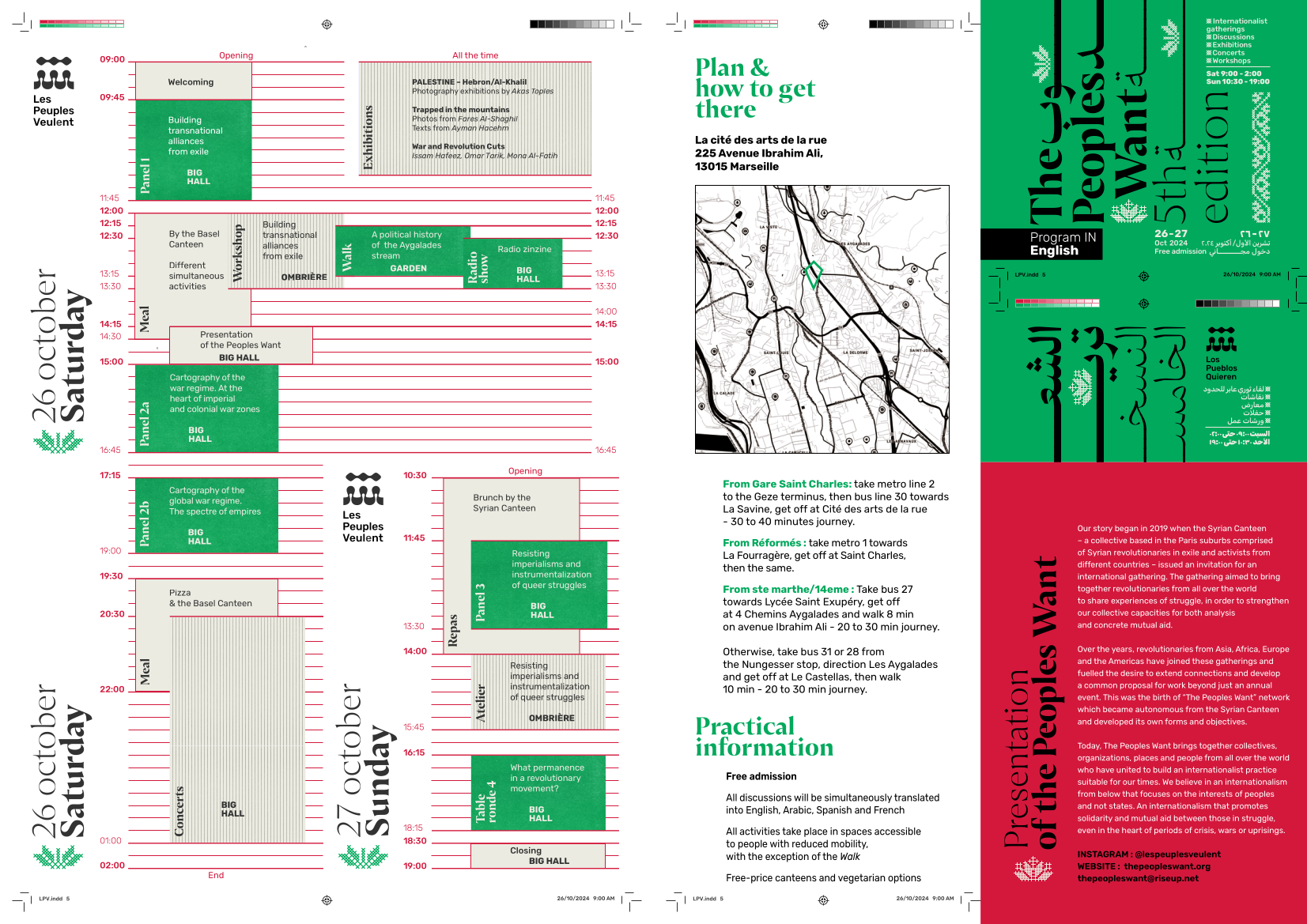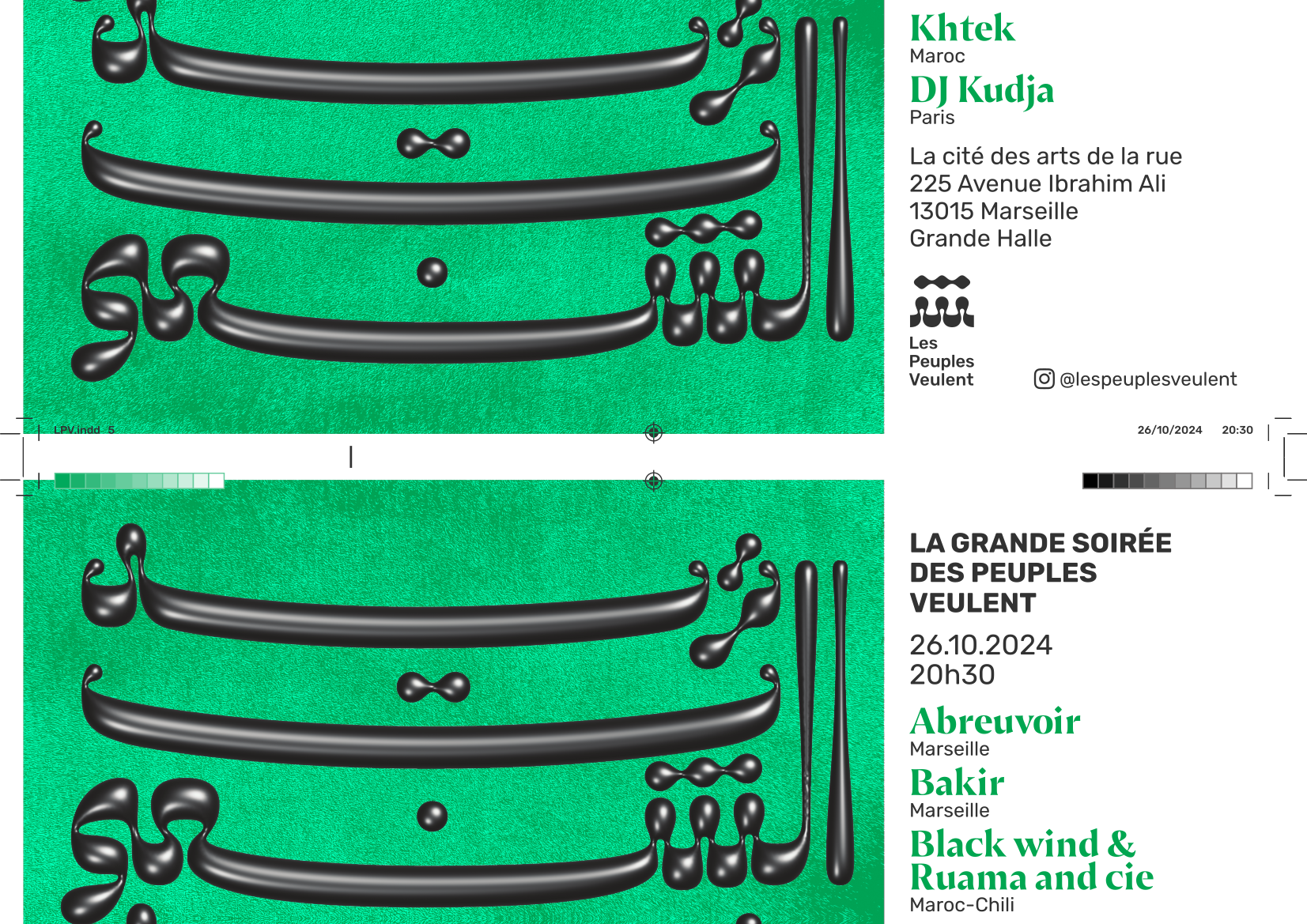The program of our 5th edition


THE PEOPLES WANT - 5th edition
Saturday 26th and Sunday 27th October 2024
Cité des Arts de la Rue
225 Ibrahim Ali Avenue - 13015 Marseille
SATURDAY
9 am Opening
9:45 am Roundtable #1: Building transnational alliances from exile — followed by a workshop at 12pm
12:15 pm Walk: A political history of the Aygalades stream
12:30 pm Radio show
2:15 pm Presentation of The Peoples Want
3 pm Roundtable #2 (Part 1): Cartography of the global war regime. At the heart of imperial and colonial war zones
5:15 pm Roundtable #2 (Part 2): Cartography of the global war regime. The spectre of empires
8:30 pm Concerts and DJ sets
Abreuvoir: Bas Rock, Rock Piéton, Chili Miel Pop / Marseille
Bakir: Electronic trio, mediterranean roots / Marseille
Black wind and cie: Tricontinental planet rap / Maroc, Chili
Khtek: Moroccan rap / Maroc
DJ Kudja: Afroclub, Amapiano, Gqom, bailetech / Paris
2 am Closing
SUNDAY
10:30 am Brunch
11:45 am Roundtable #3: Resisting imperialisms and instrumentalization of queer struggles — followed by a workshop at 2 pm
4:15 pm Roundtable #4: What permanence in a revolutionary movement?
6:30 pm Closing
Practical information
· Free entry!
· Round tables translated into Arabic, French, Spanish and English
· The Cantine de Bâle & Cantine Syrienne de Montreuil are on a “pay what you want” basis
· Refreshments with coffee, tea, soft drinks, beers and wine
Accessibility: All activities will take place in spaces accessible to people with reduced mobility except for the walk
ROUND TABLES
#1 - Building transnational alliances from exile
26-10-2024 | 9:45
Discussion between guests from Sudan, Iran and Kurdistan
The various crises – political, economic, ecological – are pushing thousands of revolutionaries onto the roads of exile. Once in a new place, some try to continue the struggle from abroad.
How is it possible to keep the ties with comrades who remain behind?
How can we keep the struggles of the country of origin alive with activists of the country of arrival?
We propose to discuss these questions with activists in exile in countries in the South and the North before continuing the reflection in a workshop in small groups.
#2 - Cartography of the global war regime. Internationalism and liberation struggles
26-10-2024 | 15:00 and 17:15
First part: In the heart of imperial and colonial war zones
Discussion with guests from Palestine, Ukraine, Sudan, Lebanon and Kurdistan
Second part: Specters of Empires
Discussion with guests from Iran, Georgia, Kanaky, Senegal and Taiwan
In a world divided into blocs, where the leaders of the BRICS, the axis of resistance and the Euro-Atlantic bloc claim to redefine the geopolitics of globalized capitalism, it becomes difficult to maintain perspectives of collective liberation when survival is the emergency.
Through a series of questions on internationalist alliances between the struggles on the peripheries, the first part of the round table will be devoted to the territories currently facing imperial and colonial wars, and the second part to the multiple facets of imperial and authoritarian regimes, as well as the struggles that continue to resist them.
#3 - Resisting imperialisms and instrumentalization of queer struggles
27-10-2024 | 11:45
Discussion between guests from Tunisia, Palestine, Lebanon, Egypt and Georgia
In a context of ultraconservative offensives and the hegemony of neocolonial progressive policies, while states oscillate between the criminalization of queer lives and the instrumentalization of their struggles, queer movements must fight on several fronts.
It is the voices of different peripheral regions that we wish to hear and bring into dialogue on the occasion of a round table on LGBTQIA+ geopolitics, followed by a workshop (only FLINTA) to share experiences, on possible alliances between feminist and queer movements from various geographical areas.
#4 - How permanent is a revolutionary movement?
27-10-2024 | 16:15
Discussion between guests from Chile, Kanaky, Sudan, Myanmar, Palestine
Counter-revolutionary forces strive to erase all memory of revolutions, to transform them into a ‘narrative’ - a new history of the victor of a time. They lock up, condemn, prosecute and drive into exile the bearers of memory, and use historical falsifications. How, despite all this, can we ensure that the memories of the struggles survive and are passed on, and that new revolutionary hopes re-emerge, both locally and on the other side of the world?